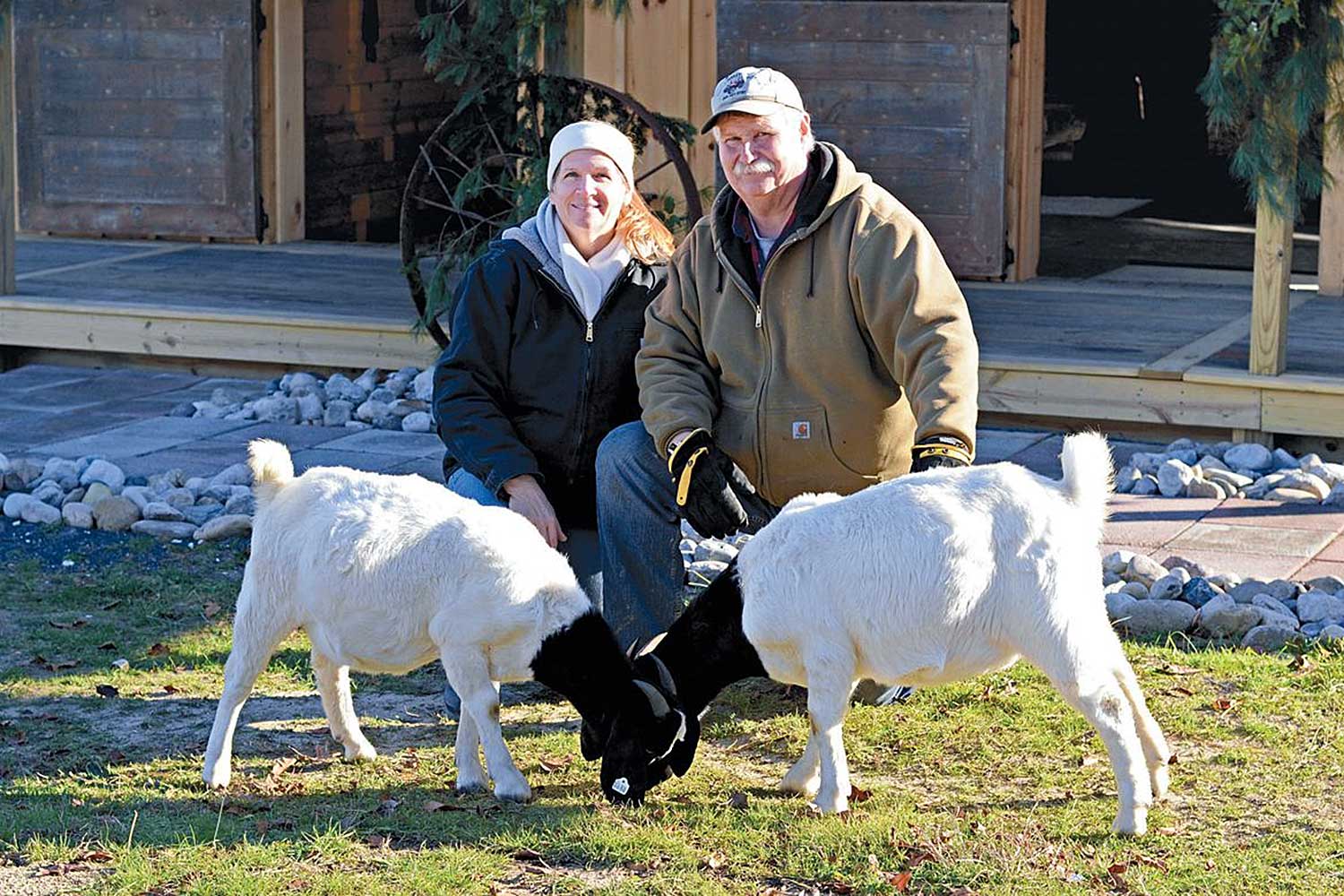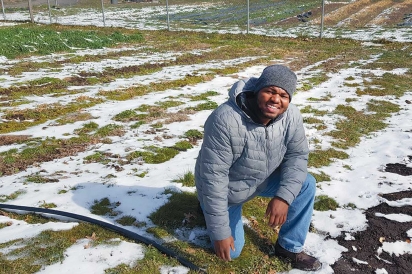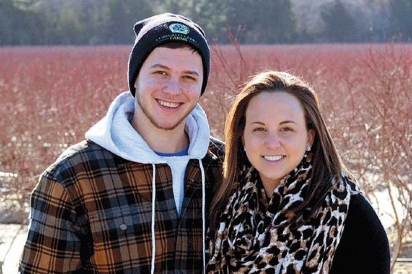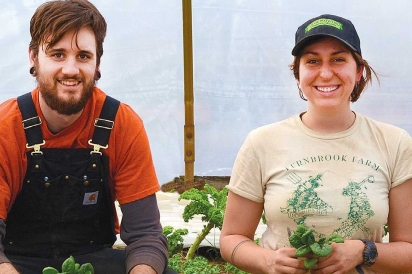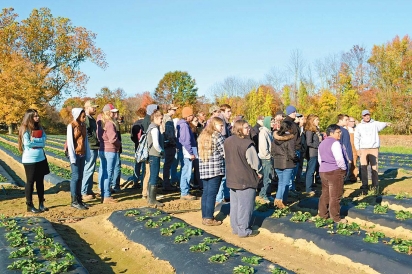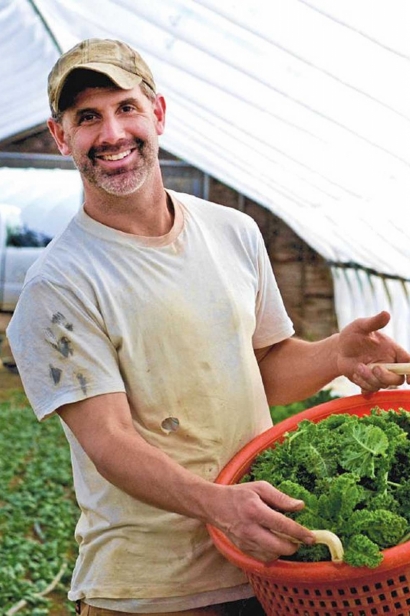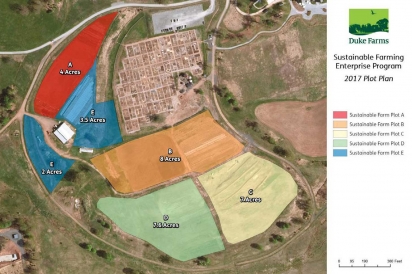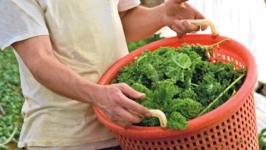Growing The Next Generation of Jersey Farmers
Baby boomers are ready to pass the torch, but are today’s young farmers ready to take it?
Rose Robson always follows this rule: If a crop crosses her path more than once, she investigates. This is how the fourth-generation farmer discovered pawpaws, a greenish tree fruit that has tropical notes of banana, mango and citrus. First, they came up in a Rutgers organic agriculture class she was visiting. Then she read about them in Modern Farmer.
Within a year, Robson had a grove of 90 trees in Wrightstown, which she tends along with flowers, field crops and peaches. Noting the pawpaw’s value as a fresh fruit and in baked goods, Robson also envisions a Jersey-pawpaw beer. An innovator with a knack for social media, she’s a pragmatist who looks for market opportunities.
In other words, she’s a farmer.
Robson never does things halfway. In her early 20s, she restarted her family farm after a six-year hiatus following her father and grandfather’s passing. Now 30, she sees farming as a calling—and thanks to the state’s Farmland Preservation Program and the foresight of her family, she had land to return to.
Even for generational farmers, that’s not always a given.
Gillian Armstrong, 23, was also poised to be a fourth-generation farmer. But her family sold their preserved Burlington County dairy farm to new farmers just as she was entering college. With no land, she chose a different but related career path and now serves as education coordinator for Cherry Grove Farm in Lawrenceville and as agricultural-programs coordinator and research assistant at Rutgers Cooperative Extension. Her tenacity and her passion about developing beginning farmers should inspire anyone interested in the industry.
From Aspiration to Reality Check
Robson and Armstrong are examples of how young agriculturalists bring creative energy to the field. The question is how many can get there. According to the 2012 USDA Census of Agriculture (due for a 2017 update), the average age of a NJ farmer is 59, a trend dubbed “the greying of the farm.” Moreover, the state currently ranks second in the nation in farm real-estate value per acre at $13,000 in 2015 and first in cropland value, at $13,500. Add in costs like tractors, irrigation and labor plus rampant development pressure, and the barriers can seem too high.
“Over the last 60 or 70 years, we’ve seen urbanization pressures in land markets that pushed farmland values,” says Brian Schilling, associate professor in the Rutgers Department of Agriculture, Food and Resource Economics and associate extension specialist in agricultural policy with the Rutgers Cooperative Extension. “We’ve lost maybe 55 percent of our farms.” With only about 715,000 acres of farmland remaining, competition is fierce.
For first-generation farmers or aspiring organic farmers, becoming a farmer is even harder. The Northeast Organic Farming Association (NOFA-NJ) is one group trying to help them get started. Among its many initiatives, NOFA-NJ pays close attention to the barriers facing beginning organic farmers, which surface from day one. It takes three years to complete a conventional-to-organic conversion. That’s a long window for a landowner and potentially untenable for a renter.
“It’s a difficult time for a young farmer because they have a lot of inputs into the farm, but don’t get the benefits of being able to market [their products as] organic,” says Stephanie Harris, NOFA-NJ’s founding member and president. Failure rates can be high.
Finding Optimism
Given all this, many in the food and agriculture community worry whether today’s young and aspiring farmers will be ready to take the helm of this billion-dollar industry. If a dedicated group of educators, policymakers and agriculturalists have their way, the answer will be yes. Through new apprenticeships, policy solutions and other initiatives, organizations statewide are putting minds and dollars toward a fix.
“A lot of focus right now is on cultivating the interest and ability for new and beginning farmers to be able to enter the industry and succeed,” Schilling says. Currently, the cornerstone policies that protect NJ agriculture are its 1980s-era Right to Farm and Farmland Preservation policies and its Farmland Assessment law, passed in 1964.
Now the focus is widening.
“We’ve been working with Rutgers Cooperative Extension and nonprofit partners such as the Foodshed Alliance and the American Farmland Trust to explore concepts like young and beginning-farmer incubators, training programs and apprentice and mentor relationships to ensure there is a next generation,” says Jeff Everett, chief of agricultural resources with New Jersey’s State Agricultural Development Committee. It’s a future that the state’s residents want. In a November 2016 Fairleigh Dickinson University Public Mind Poll, 95 percent of respondents said that they believe a strong farming industry is important to the economic health of New Jersey. The trick is to create the path.
Foundation in Education
Talk to an established farmer and one message rings clear: before you even consider a career in farming, you must know what you’re up against. The way Schilling sees it, it’s about examining your motivations.
Chelsea Consalo, vice president of Consalo Family Farms at just 24, thought long and hard before joining her family’s produce and blueberry farm, which spans two locations in Vineland and Egg Harbor City and was founded in 1927. Now she and her brother AJ, 22, work alongside their parents. Consalo handles everything from personnel training to food safety. “It’s a huge learning curve,” she says. “But we want to see the place succeed.”
To help would-be farmers make these hard decisions, new programs have cropped up, including Rutgers University’s RU Ready to Farm program. Developed by extension-team members including Armstrong and Rutgers professor Bill Hlubik, the first three-day module launched this fall. Dubbed “The Basics of Getting Started,” it covered basics like regulations and recordkeeping; a day at Bordentown’s Specca Farms focused on farm safety, soil health and more. “It’s like two semesters in three days,” Armstrong says.
“We have a great variety of students, young and older, interested in farming for the first time,” says Hlubik. Whatever the students’ backgrounds, cultivating realism about the work is paramount.
Among the program participants was Brendon Pearsall, 30, an aspiring farmer who first pursued a career in carpentry. Now enrolled at Rutgers in the Agricultural and Food Systems Program, Pearsall is changing careers because he wants a better lifestyle for his family. “We’re not going into farming to become millionaires,” he says. “I have a new daughter and want a more healthful way of living.”
Bill Simmerman is also pursuing farming as a second career. Retired from construction, he’s launching Misty Meadow Farm, a 16-acre dairy for artisan cheese production in Petersburg, NJ. After a test run living on the Gulf Coast, he and his wife Barbara returned north, determined to create a legacy for their children. “I could have very comfortably stayed in Florida and collected my retirement,” Simmerman says. But he wanted to give the family something to work toward.
This spring, RU Ready to Farm’s second module focused on specialty crop production, which is essential when land is hard to come by. As a Cape May extension agent and project director for the Ultra-Niche Crops for the Progressive New Farmer program, Jenny Carleo saw that need as well. So she and Jennifer Matthews—a farmer, a fellow extension researcher and director of the New Jersey Agricultural Leadership Development Program—decided to brainstorm. Ultimately, Matthews hit on the core idea: “I need to know how to make more money on less land.”
Backed by a $460,000 USDA grant, the series launched in September and is all about maximizing dollars per acre through high-value crops like peppers, cut flowers and greens. “Lack of contiguous acreage in New Jersey makes niche production essential,” Carleo stresses. “It’s a paradox: you want to start small—and kind of have to. But you have to have enough space to grow.”
Up in Sussex County, David Zelov and Danielle Szepi of Kittatinny Mountain Farm (see Edible Jersey, ”Mountain Farmers,” Spring 2014) bring that point to life. They’re entering their seventh season as farmers and their third as in-demand organic producers. The problem: They’ve reached the capacity of their rental space. “Demand is strong. But we are not able to grow more,” Zelov says. So they’ve remained small. They hope to buy or lease a larger property soon, but finding the right parcel is a complex process, especially in that part of the state.
For those who want to follow in Zelov’s and Szepi’s footsteps, there’s another challenge: learning sustainable production. NOFA-NJ can help with a range of educational courses. “Organic agriculture lies at the nexus of so many things,” says Adrian Hyde, executive director. “It plays a pivotal role in human health, environmental change and local employment, which resonates with a lot of younger people.” NOFA-NJ’s education series starts with “Exploring the Small-Farm Dream,” which lays the foundation—and winnows out the dreamers. “The very first course is critical in that it explains all of these issues to the would-be farmers and helps them focus on what it means to run a small business,” says the organization’s president Stephanie Harris. The second course, “Tilling the Soil of Opportunity,” walks students through writing a business plan. Other courses break down the requirements for organic certification.
Firsthand Experience
This summer, NOFA-NJ also hopes to restart a critical phase in its beginning-farmer series: time at the program’s incubator farm. The project ran in partnership with Duke Farms and covered land, equipment and mentoring.
If the success of the apprenticeship program at the Fernbrook Farm in Bordentown is any indication, young farmers are eager for those hands-on experiences.
Jeff Tober, Fernbrook’s farm manager, found his way to Larry Kuser’s 230-acre property via NJ Land Link, which connects landowners and farmers. He launched the apprenticeship program in 2008, based on his own experience at Brookfield Farm in Amherst, Massachusetts. “I’m in my tenth year here and we’ve had about 25 apprentices,” Tober says.
There’s a laid-back atmosphere at the chemical-free farm, where laughter punctuates the hard work of running a 3,000-share community-supported agriculture (CSA) program. Still, Tober’s expectations are high. It’s a recipe that launches careers.
After attending Ramapo College and working in a biotech lab, Jess Brandeisky, 28, signed on for a Fernbrook workshare, trading work on the farm for a weekly CSA box. She moved on to become an apprentice and served as a farm assistant for two years. Now she’s an assistant manager. Former apprentice Nick Delmar, 26, is returning for his third season as a farm assistant. He came to Fernbrook after studying plant science at Rutgers.
A key takeaway for both is the need for attention to detail. Looking forward, they’re open to their options. They’re aware of the new opportunities for young farmers in urban agriculture. So is Brandon Ritter, 23, who recently moved on to Food Moxie in Philadelphia after three years as urban agriculture associate with Trenton’s Isles, Inc. Not only is he working in the field, he’s training others to join him.
Tober says his program is a way to learn risk management. “How do you plan for the season? How do you implement the plan? Then, on a daily basis, how do you change the plan? I try to be crystal clear about what farming is all about,” he says.
For the last two years, Tober has also coordinated the NJ Collaborative Regional Alliance for Farmer Training (NJ CRAFT). A grassroots collective of 30 farms in New Jersey and Pennsylvania, it includes workshops where trainees network and gain exposure to different farm models. “One of the things I love about this profession is that there’s competition, but a lot of cooperation,” Tober says. As in most other fields, for farmers, networking is essential.
With that in mind, the New Jersey Farm Bureau relaunched NJ’s Young Farmers and Ranchers Program several years back. “We want to encourage young and beginning farmers to get involved and be part of our leadership,” says Liz Thompson, research associate. “This way, they’re not just farming on their own. They’re part of a network.” Debbie Pribell, membership coordinator, notes that first-time farmers are especially eager for business training.
For those with a few years of experience, the New Jersey Agricultural Leadership Development Program helps build networks and confidence. “The program started with the insight that some young folks never had the opportunity to step outside the world of the farm,” says Kristina Guttadora, executive director of the NJ Agricultural Society. “As people were going to county board meetings, they don’t know how to be a leader.” Guttadora and Jennifer Matthews teach farmers how to speak up regarding regulations, municipal concerns and other important issues.
Getting Ready
While many assume that launching a farming career means building a business plan and buying property, there’s more than one way to become a farmer. In fact, options abound. “If you’re new to farming—try to get your feet wet” before diving in,” says Schilling. “Maybe there’s an opportunity to have a relationship with an existing farmer.” Leasing land is one alternative to buying. There is, however, a flip side: “If you lease land, you’re governed by the terms of the lease.” That can make beginning farmers wary of making investments to soil and infrastructure.
Whichever path a young farmer takes, Land Link is a great place to start. The website was funded by a USDA grant. Launched in June 2015, it allows farmers and landowners to create listings and covers everything from potential partnerships to land sales. “We’re trying to make more information accessible to those looking for farmland,” Schilling says, adding that the website “is really a matchmaker.”
“Land Link replaced a system that included only tabular listings without any mapping, photos or search-and-filter functions,” Jeff Everett says. “Now we are exploring ways to enhance the site by adding new Geographic Information System data layers and other features.”
Together, NOFA-NJ and partner organizations are currently working to build awareness. “Our mission is to support local sustainable farming in NJ and to make healthy food available to all,” says Kendrya Close, executive director of the Foodshed Alliance. Through a foundation grant, the group has been charged with assessing Land Link’s usability.
Seeds of Hope
Ultimately, the very thing that makes NJ farming challenging may secure its future: an enormous, food-aware population within easy reach. While that’s a driving force behind NJ’s high land prices and development pressure, it also creates a hungry market.
“There are 31 million people to feed in the New York and Philadelphia metropolitan areas, which represents nearly one in ten Americans,” Jeff Everett says. “With high-quality soils over much of the state, access to water and a highly skilled group of farmers combined with a burgeoning locavore movement, I think the future is bright for agriculture in the Garden State.”
Brian Schilling concurs, seeing that population’s trillion dollars in combined purchasing power as a silver lining.
“Are you going to make a lot of money? Probably not,” Larry Kuser of Fernbrook Farm says. “But are you going to live a good life? Absolutely.” Kuser preserved his farm in 1996, a move that policy-minded experts see as an investment in New Jersey’s agricultural health.
“Farmland preservation, by removing the development rights from the land and making it more affordable for purchase by beginning farmers, can play an important role,” Everett says. NOFA-NJ shares an optimistic view. “The young farmers I have encountered have the same passion about environmental qualities and health of the food system that drove me to farming in the sixties,” Stephanie Harris says.
If young farmers enter the field with their eyes open and make use of the technological and other resources available to them, the outlook remains bright—whether they hope to run an organic CSA or create the next pawpaw empire.
Words of Wisdom
“Any step you can take to give yourself more knowledge, to expand your network and make friends, is worthwhile.” —Rose Robson, Robson’s Farm, Wrightstown
“Think about where you want to be. Farming is so connected to place and community.You don’t want to start renting somewhere and then move far away.” —Dave Zelov, Kittatinny Mountain Farm, Sussex
“You have to really push it on all fronts if you want to be able to profit.” — Jess Brandeisky, Fernbrook Farm, Chesterfield Township
“Go to NOFA’s website. It’s the first thing I checked to find an apprenticeship.” —Nick Delmar, Fernbrook Farm, Chesterfield Township
“You have to be comfortable with the people around you, to be willing to talk with them and ask for help.” —AJ Consalo, Consalo Family Farms, Vineland/Egg Harbor City
“Go to conferences. Start attending county board meetings. Build a mentor network.” —Kristina Guttadora, NJ Agricultural Society
“Have a buyer before you grow.” —Jennifer Matthews, Stone Circle Farm, Cape May Courthouse
“There’s a wealth of experience out there.You just have to ask. As a rule, farmers are very generous with their knowledge.” —Liz Thompson, NJFB
RESOURCES
Department of Agriculture
Farm Credit East
Foodshed Alliance
Future Farmers of America
New Jersey Agricultural Society
New Jersey Agricultural Leadership Development Program
Rutgers Cooperative Extension
NJ Farm Bureau
NOFA-NJ
Ultra-Niche Crops for the Progressive New Farmer
USDA New Farmers
Young Farmers & Ranchers
Duke Farms Sustainable Farming Enterprise Program
Early-Stage Support for Emerging Farmers
When it comes time for a beginning armer to launch a business, having the right support in place can be a make-or-break factor. This is even more important for those committed to pursuing local, sustainable production. From attaining organic certification to connecting with the right markets, every aspect of the plan must be vetted with a critical eye.
Recognizing that need, Duke Farms in Hillsborough launched its Sustainable Farming Enterprise Program (SFEP) in 2017. Bringing together four proving early-stage farmers, the program takes participants through a three-year sequence designed to help them succeed. The farmers are supported by Duke Farms’ experienced staff, who enjoy access to the organization’s impressive agricultural infrastructure.
“Duke Farms feels that we can help new farmers address common challenges,” says Michael Catania, executive director of Duke Farms. Reflecting the state’s varied agricultural landscape, he notes that the inaugural class reflects a diversity of enterprises, including:
Green Duchess Farm: pasture-raised pork, turkey and other animals
Hunter Family Farms: laying hens, meat, chickens and berries
Farmer Meg: cut flowers and goat-milk soap
Sole Purpose Farm: produce and ethnic vegetables
SFEP is intended for those with prior field experience. The idea is to offer a bridge as they set out on their own. Benefits include land and equipment access, technical support, optional housing and inroads to local markets, including the Duke Farms Farm-to-Table Market and Farm Barn Café. Participants are also guided through organic and human certification and Natural Resources Conservation Service conservation planning; they also receive assistance fining a long-term lease upon graduation.
The goal is to launch a new generation positioning to build and evolve the region’s food shed. While the program is currently full, Catania says that there are hopes for future expansion.


